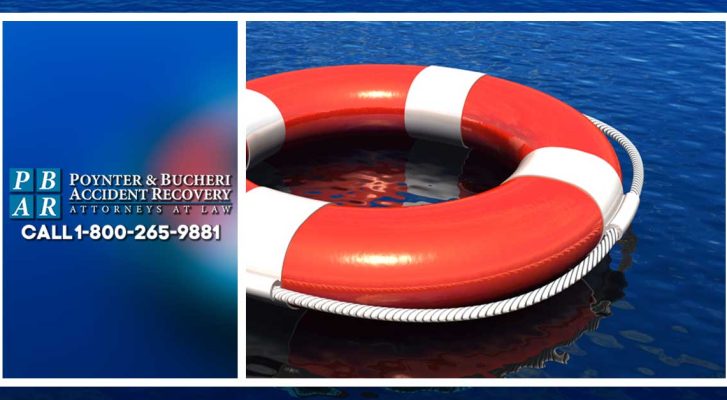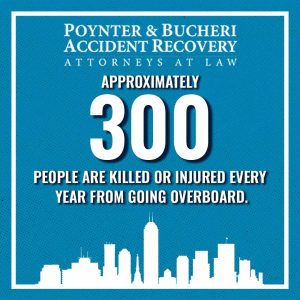
Falling Overboard: How to Handle Boating Accidents Legally

What you’ll learn from this article:
- Many things can cause someone to fall overboard, including operator negligence.
- As a boat owner or operator, Indiana law assigns you a duty to be careful and prudent.
- You can take immediate steps to help someone who has fallen overboard and return them to safety.
With 86 lakes and 65 rivers, Indiana is home to a large population of enthusiastic boaters. This brings the constant risk of dangerous boating accidents.
The U.S. Coast Guard investigates about 40 significant boating accidents in Indiana every year. Additional boating accidents go unreported due to boaters’ fears about alcohol use, liability, and other factors.
This article looks at Indiana boating accidents from a legal standpoint. Below, learn more about what to do after a fall overboard.
What is Most Likely to Cause Someone to Fall Overboard?

The top 5 types of boating accidents are collisions with other watercraft, collisions with fixed objects, flood/swamping, grounding, and falls overboard. Nationwide, approximately 300 people are killed or injured every year from going overboard.
Most people don’t end up in the water for no reason. When a passenger on a small boat falls overboard, there is usually a major contributor to the incident.
The top 10 contributing factors to Indiana boat accidents are:
- Boat operator inattention
- Improper lookout
- Operator inexperience
- Boat machinery failure
- Speeding
- Alcohol use
- Wake/waves
- Weather
- Violating navigational rules
- Hazardous water conditions
How Can You Prevent a Fall Overboard?
Take steps to provide safety for everyone on your watercraft. Start by educating yourself about Indiana boating, which is governed by both state and federal laws.
State laws are outlined in Title 9 of the Indiana Code and Title 312 of the Indiana Administrative Code. Federal laws are located in Title 33 of the Code of Federal Regulations. In addition to the Coast Guard, state conservation officers and the Department of Natural Resources patrol Indiana waterways.
Obtain an Indiana certificate of registration from the Bureau of Motor Vehicles. Display your decal on the side of your boat. Any water vessel with an electric motor must be registered, including boats, jet skis, jetboats, pontoons, and yachts.
To operate a watercraft, you should be a licensed driver, and it’s a good idea to take a boater safety training course. No one under the age of 15 may operate a personal motorboat or watercraft over 10 horsepower in Indiana. Watercraft must have at least one Coast Guard-approved PFD per person on board.
Stay sober and vigilant whenever you’re out on the water. Prevent people on board from becoming too intoxicated, rowdy, or inattentive to ride safely. Obey boating speed, idle, and wake zone laws. The Indiana Supreme Court has ruled that boat operators have a duty to operate a boat in a careful and prudent manner.
What Should You Always Do When a Person Falls Overboard?
Immediately after a fall overboard, yell out, “Man overboard!” or “Person overboard!” to alert boaters to the emergency. This draws everyone’s attention to the area and prevents more people from going overboard.
From there, focus on the three Rs of water rescue:
- React by alerting everyone to the situation while remaining calm.
- Return the overboard person to the watercraft or shore.
- Recover by helping the person breathe, re-warm, and access emergency care.
Make sure they have a personal flotation device (PFD) like a lifejacket within reach. If it is impossible to return them to immediate safety, instruct them to remain still in the water and slowly move their body into the HELP position, which stands for heat escape lessening position. They should bring their knees up toward their chest, wrap their arms across their body, and try to maintain their body heat.
Call 911 to report the accident and/or use Channel 16 of a marine VHF radio to make a distress call. Do not stop attempting to reach help until you receive a response and get the overboard person to safety.
Indiana law requires you to remain at the scene of a boat accident and give assistance to injured people. Report the accident to the nearest police or conservation office as quickly as possible and file an accident report within 24 hours if someone is injured, dies, disappears, or when vessel damage exceeds $750.
Poynter & Bucheri Accident Recovery – Indianapolis Boating Accident Attorneys
If you were in a boating accident and want to claim injury compensation, you’ll need to prove that someone acted negligently and their carelessness caused your injuries. A variety of people may hold a level of fault for what happened, including your boat’s operator, another boat operator, a boat owner, an employer, or a manufacturer.
A boat accident lawyer helps protect your rights as you navigate the legal system. Your lawyer can also deal with insurance companies, negotiate your medical bills, and pursue the compensation you deserve through a court case or out-of-court settlement.
After a fall overboard, contact the Indiana attorneys at Poynter & Bucheri Accident Recovery by calling 1-800-265-9881. We’ll provide a free case review to help you understand your options and decide what to do next. Our goal is to help you recover and move forward from your boating accident.
